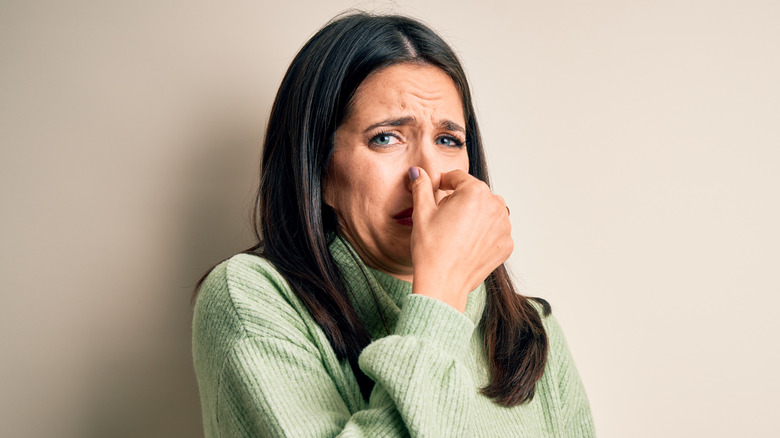
The internet poses some intriguing questions. Some are amusing, others are absurd, and a few are quite thought-provoking. One such query that surfaced on the internet (particularly on Reddit and Facebook) in 2012 was, “Does farting burn calories?”
A popular social media post claimed that the average person could burn up to 67 calories by farting once (via Women’s Health). While this number is impressive, is it accurate? Do you actually burn calories through this normal, albeit odorous, bodily function? Unfortunately, experts say there’s no truth to this social media “fact.”
According to Tanya B. Freirich, a nutritionist and registered dietitian based in New York, tooting, defined as expelling excess gas from your digestive system through your anus, occurs when your muscles relax (per Health). To burn calories, muscle activation is required, not relaxation. Thus, letting it rip is not among those unusual activities that help you burn calories.
Loud and strong farts don’t burn calories, either

Regarding loud toots, the answer remains the same, according to Dr. Matthew R. Pittman, medical director of the weight management and bariatric surgery program at Northwestern Medicine Delnor Hospital (via Women’s Health). “Even if you experienced the most violent, explosive fart you can imagine, it would be pretty difficult to burn calories during it,” explained Dr. Pittman.
But what if you strain to fart? Would that burn any calories? According to Healthline, there might be a slight possibility, but the amount would be negligible – maybe one or two calories at most. “You cannot fart yourself thin. Farting is not a practical weight-loss tool. It cannot replace regular exercise,” emphasized Dr. Pittman.
That said, passing gas can sometimes make you feel lighter and less bloated. Foods and drinks like cruciferous vegetables, carbonated beverages, and lactose can cause bloating. Farting is a way to alleviate this bloated feeling. However, it’s essential to understand what your farts may indicate about your health. Here’s when excessive gas might be a concern.
If you’re straining to fart or farting excessively, see a doctor

Typically, a person farts between 10 and 20 times a day, according to Healthline. If you feel you’re farting more than average, consider adjusting your diet. Go easy on lactose, beans, cabbage, Brussels sprouts, fatty foods, fizzy drinks, etc. Also, be mindful of whether you’re eating quickly, as swallowing excess air and even smoking can increase flatulence.
If you experience persistent or strained farting along with symptoms like loose stools, constipation, vomiting, weight loss, chest pain, heartburn, or bloody stools, it’s advisable to see a doctor, according to the Mayo Clinic.
If you’re seeking innovative methods to burn calories without exercising, fidgeting is more effective, according to Harvard Health. Consider quickening your walking pace or choosing stairs over the elevator. Even laughing and chewing gum burn some calories. Ultimately, significant calorie loss is achieved through a combination of a balanced diet and regular exercise.




